
Charles Darwin’s
129th death anniversary:
Revolutionary impact of the Theory of Evolution
Gaston de Rosayro
Charles Robert Darwin was born on February 12, 1809 in Shrewsbury,
England died on this very day (April 19, 1882). Darwin was born on the
same day as Abraham Lincoln. Darwin was the British naturalist who
became famous for his theories of evolution and natural selection. Like
several scientists before him, Darwin believed all the life on earth
evolved (developed gradually) over millions of years from a few common
ancestors.
|
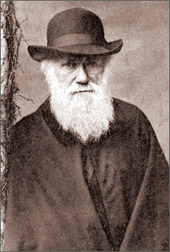
Charles Robert Darwin |
In 1831, Darwin set out on H M S Beagle as a self-financed gentleman
companion to the 26-year-old captain, Robert Fitzroy. The Beagle was on
a British science expedition around the world. In South America Darwin
found fossils of extinct animals that were similar to modern species. On
the Galapagos Islands in the Pacific Ocean he noticed many variations
among plants and animals of the same general type as those in South
America.
The expedition visited places around the world, and Darwin studied
plants and animals everywhere he went, collecting specimens for further
study.
Upon his return to London in 1836, Darwin conducted thorough research
of his notes and specimens. Out of this study grew several related
theories: one, evolution did occur; two, evolutionary change was
gradual, requiring thousands to millions of years; three, the primary
mechanism for evolution was a process called natural selection; and
four, the millions of species alive today arose from a single original
life form through a branching process called ‘speciation’.
Revolutionary theory
Darwin’s theory of evolutionary selection holds that variation within
species occurs randomly and that the survival or extinction of each
organism is determined by that organism’s ability to adapt to its
environment. He set these theories forth in his book called, On the
Origin of Species by Means of Natural Selection, or the Preservation of
Favoured Races in the Struggle for Life (1859) or “The Origin of
Species” for short. After publication of Origin of Species, Darwin
continued to write on botany, geology, and zoology until his death in
1882. He is buried in Westminster Abbey.
Darwin’s work had a tremendous impact on religious thought. Many
people strongly opposed the idea of evolution because it conflicted with
their religious convictions. Darwin avoided talking about the
theological and sociological aspects of his work, but other writers used
his theories to support their own theories about society. Darwin was a
reserved, thorough, hard working scholar who concerned himself with the
feelings and emotions not only of his family, but friends and peers as
well.
It has been supposed that Darwin renounced evolution on his deathbed.
Shortly after his death, temperance campaigner and evangelist Lady
Elizabeth Hope claimed she visited Darwin at his deathbed, and witnessed
the renunciation. Her story was printed in a Boston newspaper and
subsequently spread. Lady Hope’s story was refuted by Darwin’s daughter
Henrietta who stated, “I was present at his deathbed ... He never
recanted any of his scientific views, either then or earlier.”
Darwin’s mother died when he was eight years old. Otherwise he
enjoyed a golden childhood, cosseted and encouraged by adoring sisters,
an older brother, and the large Darwin and Wedgwood clans. He was keenly
interested in specimen collecting and chemical investigations, but at
the Shrewsbury school, where he was an uninspired student, the
headmaster, Dr Samuel Butler, stressed the classics and publicly rebuked
Darwin for wasting his time with chemical experiments.
Youth and education
At age 16 he was sent to study medicine at the University of
Edinburgh, where he was repelled by surgery performed without
anaesthetics. During his two years in Scotland Darwin benefited from
friendships with the zoologist Robert Grant, who introduced him to the
study of marine animals, and the geologist Robert Jameson, who fed his
growing interest in the history of the Earth.
Disappointed by Darwin’s lack of enthusiasm for medicine, his father
sent him to the University of Cambridge in 1827 to study divinity. At
the time Darwin adhered to the conventional beliefs of the Church of
England. His academic record at Christ’s College was as undistinguished
as it had been at Edinburgh.
He socialized considerably with hunting, shooting, riding, and
sporting friends. Cambridge did not yet offer a degree in the natural
sciences, but, guided by his older cousin William Darwin Fox (an
entomologist who inspired in him a lifelong passion for collecting
beetles), Darwin met the circle of Cambridge scientists led by the
cleric-botanist John Stevens Henslow.
Soon a regular at Henslow’s “open houses,” Darwin accompanied him on
daily walks and became known as “the man who walks with Henslow.”
Henslow encouraged Darwin’s excitement about science and confidence in
his own abilities.
On leaving Cambridge in the spring of 1831 Darwin, in preparation for
a scientific trip to the Canary Islands, read Alexander von Humboldt’s
Personal Narrative of Travels to the Equinoctial Regions of the New
Continent, a scientific travelogue of a journey to Central and the
northern parts of South America. At Henslow’s recommendation he
accompanied Adam Sedgwick, Woodwardian professor of geology at
Cambridge, on a three-week tour of North Wales to learn geologic
fieldwork.
In August 1831, at Henslow’s recommendation to the Admiralty, Darwin
was invited to sail as the unpaid naturalist on HMS Beagle. The ship was
to survey the east and west coasts of South America and continue to the
Pacific islands to establish a chain of chronometric stations.
Galapagos
Henslow suggested Darwin as both an acute observer and a companion
for the aristocratic young captain, Robert FitzRoy. (The Beagle already
had a naturalist-surgeon, but one whom FitzRoy found socially
unsuitable.) Robert Darwin first refused permission on grounds that it
was dangerous and would not advance Charles in his career. But upon the
intercession of his brother-in-law, Josiah Wedgwood II, he changed his
mind. On December 27, 1831, Charles Darwin sailed from Plymouth, Eng.,
on the Beagle, a 10-gun brig that had been refitted as a three-masted
bark. The voyage, planned for two years, lasted five, during which
Darwin kept meticulous notes and sent back geologic and biologic
specimens.
In a letter to FitzRoy accepting the post Darwin explained that he
expected the voyage to be a “second birth.” There is no doubt that the
years he spent exploring the South American continent and the offshore
islands of the Galapagos honed his skills as a collector, observer, and
theorist.
Often seasick, Darwin rested horizontally in a hammock during the
worst motion and spent long periods of time ashore whenever the
opportunity arose. He delighted in the exotica of the tropics.
Adventurous, he braved his way through armed political rebellions, rode
with the gauchos in Argentina, and on collecting and shooting
expeditions justified his earlier devotion to sport.
He joined the crew in towing the ship’s boats upstream and once
rescued the expedition by running to save a boat from a tidal wave. He
seemed to relish danger and was sustained in the considerable discomfort
by a lively curiosity.
[Lord Byron]
Of high moral standards
Dilmika Tennakoon
|
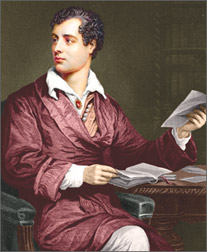
Lord Byron
|
George Gordon Noel Byron, also known as Lord Byron, born January 22,
1788 in London died on a day like today. He was a famous as well as
controversial English Romantic poets of the late 17th and early 18th
Century.
He studied at a Grammar school in Scotland after his mother and he
settled in Scotland.
They had a hard life, living in lodgings and had a small income to
barely fulfil their needs. It is said that he was abused by his nurse
when he was young and as an impact he displayed animosity towards women
later in his life.
He inherited the title and also the estates from one of his
great-uncles at the age of 10. His mother and he, came to England and
settled in Newstead Abbey as King Henry eight had presented the Newstead
Abbey to Byron.
Byron graduated from Cambridge in 1808. Hours of Idleness was Byron’s
first collection of poetry which appeared in 1807.
The collection was not successful and came under heavy criticism.
Byron published the first two cantos of Child Harold’s Pilgrimage in
1812. This was his real poetic success. He became famous in London
society with its appearance. His other famous work The Corsair (1814),
sold 10,000 copies on the first day of publication.
Byron left England in 1816 due to rumours of his incest and debts.
His Satiric masterpiece, Don Juan was written during his stay in Italy.
Byron was condemned by his contemporaries for his moral standards.
Although he was criticized badly his influence on European poetry,
music, novel, opera and painting was enormous. Byron fell ill on April
9, 1824 and died ten days later in Greece at the age of 36. At the time
of his death he was engaged in the Greek struggle for independence.
He was buried near Newstead Abbey after his body was returned to
England. His death was a great loss to English literature.

Bay of Pigs invasion
|
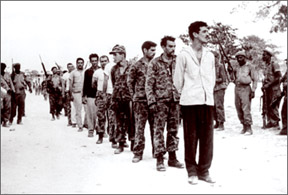
Prisoners of the battle
|
The Bay of Pigs Invasion or the Giron Battle was an unsuccessful
action by a CIA-trained force of Cuban exiles to invade southern Cuba,
with support and encouragement from the US government, in an attempt to
overthrow the Cuban government of Fidel Castro.
The invasion was launched in April 1961, less than three months after
John F Kennedy assumed the presidency in the United States. The Cuban
armed forces, trained and equipped by Eastern Bloc nations, defeated the
invading combatants within three days.
The main invasion landing took place at a beach named Playa Giron,
located at the mouth of the bay. The invasion is named after the Bay of
Pigs, although that is just one possible translation of the Spanish
Bahia de Cochinos.
In Cuba, the conflict is usually known in Latin
America as La Batalla de Giron, or just Playa Giron.
Sky diving
|
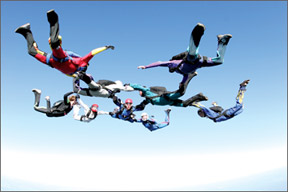
Skydivers making formations |
Also known as Parachuting, skydiving is the action of exiting an
aircraft or jumping off a tall structure, and returning to earth with
the aid of a parachute.
It may involve a certain amount of free-fall, a time during which the
parachute has not been deployed and the body gradually accelerates
downward.
Junta
A group of military officers ruling a country after seizing power
Fascicle
A bundle or a cluster. Fascicle in terms of a book is a discrete
section issued or published separately
Bicycle Day
|
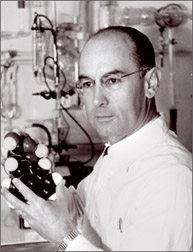
Albert Hofmann
|
The psychedelic drug LSD was first synthesized by the Swiss chemist
Albert Hofmann in the Sandoz (now Novartis) laboratories in Basel,
Switzerland 1938. Three days later, April 19, 1943, Hofmann performed a
self-experiment to determine the true effects of LSD, intentionally
ingesting 0.25 miligrams of the substance, an amount he predicted to be
a threshold dose (an actual threshold dose is 20 micrograms).
Less than an hour later, Hofmann experienced sudden and intense
changes in perception.
He asked his laboratory assistant to escort him home and, as use of
motor vehicles was prohibited because of wartime restrictions, they had
to make the journey on a bicycle. On the way, Hofmann’s condition
rapidly deteriorated. Soon his terror began to give way to a sense of
good fortune and enjoyment.
The events of the first LSD trip, now known as “Bicycle Day”, after
the bicycle ride home, proved to Hofmann that he had indeed made a
significant discovery.
A psychoactive substance with extraordinary potency, capable of
causing paradigm shifts of consciousness in incredibly low doses,
Hofmann foresaw the drug as a powerful psychiatric tool; because of its
intense and introspective nature, he couldn’t imagine anyone using it
recreationally.

1529 – Second Parliament of Spiers bans Lutheranism
1713 – With no living male heirs, Charles VI, Holy Roman Emperor,
issues the Pragmatic Sanction of 1713 to ensure that Habsburg lands and
the Austrian throne would be inherited by his daughter, Maria Theresa of
Austria (not actually born until 1717).
1770 – Captain James Cook sights the eastern coast of Australia.
1810 – Venezuela achieves home rule: Vicente Emparan, Governor of the
Captaincy General is removed by the people of Caracas and a Junta is
installed.
1839 – The Treaty of London establishes Belgium as a kingdom.
1909 – Joan of Arc, declared a saint
1910 – Halley’s Comet seen by naked eye 1st time this trip (Curacao)
1919 – Leslie Irvin of the United States makes the first successful
voluntary free-fall parachute jump using a new kind of self-contained
parachute.
1928 – The 125th and final fascicle of the Oxford English Dictionary
is published.
1936 – Anti-Jewish riots break out in Palestine
1943 – Bicycle Day – Swiss chemist Dr Albert Hofmann deliberately
takes LSD for the first time.
1954 – Constituent Assembly of Pakistan decides Urdu and Bengali to
be national languages of Pakistan.
1960 – Students in South Korea hold a nationwide pro-democracy
protest against their president Syngman Rhee, eventually forcing him to
resign.
1961 – The Bay of Pigs invasion of Cuba ends in success for the
defenders.
1971 – Launch of Salyut 1, the first space station.
1995 – Oklahoma City bombing: The Alfred P Murrah Federal Building in
Oklahoma City, Oklahoma, USA, is bombed, killing 168. That same day
convicted murderer Richard Wayne Snell, who had ties to one of the
bombers, Timothy McVeigh, is executed in Arkansas. |



